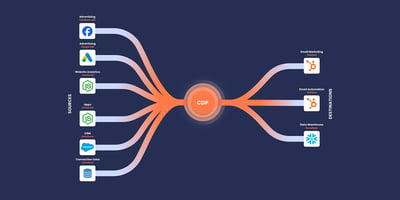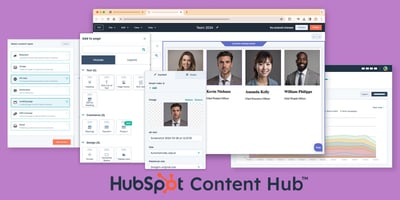What is an ERP?
ERP systems help businesses manage everyday business activities like accounting, HR, procurement, project management and supply chain management.
These tools help businesses manage, predict and act to streamline business processes and allocate resources. ERP systems can also assist in automating specific business tasks and launching new business models faster.
What is a CRM?
A CRM is exactly what it says on the box - it’s a customer relationship management system. They manage relationships with customers, including customer acquisition, customer support, and customer retention.
Sales, support and marketing teams use CRMs. As such, it is not a natural thing for CRMs to contain HR, Financial, and supply chain data.
But my ERP has a CRM already
Not so fast. ERP system vendors often position themselves as having built-in CRM systems. In truth, the only ERPs that have worthy integrated CRM are Salesforce and Microsoft Dynamics.
For example, SAP, Oracle and Sage CRMs are laughable when you compare their CRM capabilities to the real CRMs like Hubspot, Salesforce, and Microsoft Dynamics. Asking a salesperson to track all their activities in SAP or Oracle is like giving them an additional 40 hour a week job.
4 Benefits of an ERP integrated CRM
There are many reasons to integrate your ERP with your CRM. I could write a list as long as my arm, but who has time for that?
To get you started, here are four key benefits of integrating your CRM with your ERP.
1. Contact and account syncing
A CRM stores all your customer and prospect data related to sales and marketing, whereas your ERP maintains invoicing, delivery, and payment information.
Once a sale is made, the account in the CRM is passed over to the ERP, which takes over the management as the business delivers and ships products and services. With no integration in place - this is usually a manual process.
At the point the data is handed over, the data integrity between the two systems is perfect. But what does it look like a year down the line? Generally terrible.
Over time people in a business change. The team members sending invoices, collecting payment, shipping products, and supporting the client need to keep the ERP up to date to get their job done. If the key manager at a client is replaced, they change, including name, email, mobile number, etc.
Now, what happens when the marketing team sends out an ‘end of support’ notice for the product/service the client uses? They still have the previous manager in the CRM. The client doesn’t get the notice, and a problem brews.
Syncing contacts and accounts between HubSpot CRM and our clients’ ERP systems is the first and most important integration piece we implement. It solves so much and is relatively easy to implement if you’ve done it before.
2. Accurate quote and order management
Deals and quotes are generally put into the CRM by salespeople. But it’s the ERP that manages the orders, invoices, and delivery.
With an integrated CRM, your sales teams can quote accurately with accurate pricing and warehouse inventory. They can advise the client on a deal before taking the order or swing the client to another product in stock.
Delays and issues can also be synced from the ERP to the CRM to help sales and support manage client expectations and communications.
3. Reduce duplication and increase knowledge sharing
A linked system prevents duplication of data between departments. This also means that each department has access to the additional data and documents for the account. For example, a sales rep can have a full history of sales orders or support history inside the CRM.
Workflows, automation and communications can be connected to ensure a consistent message is delivered across multiple teams. Ultimately this smooths the sales process and amplifies the return on investment in your CRM.
4. Improve forecasting and reporting
Giving your sales reps access to vital financial information stored in your ERP while they're forecasting can prevent much frustration.
For example, maybe an account is on hold due to non-payment, and the salesperson has a large deal scheduled to close this month. Her sales manager is expecting the deal to close and has promised the CEO a great month. The CEO has made specific business decisions based on this intel. The salesperson might close the deal, but the business won’t deliver due to financial risk.
With the account ‘on-hold flag in their CRM, the salesperson can decide to help remove the hold to enable a sale or move on and focus on another account. Either way, the forecast becomes more accurate.
Integrating your ERP and CRM lead to more accurate forecasting, planning and detailed reporting.
Integrating HubSpot CRM with your ERP
- If you’re reading this, you likely are in one of three situations.
- You have an ERP and HubSpot CRM already, and you want to integrate.
- You have an ERP and are looking for a CRM.
- Or lastly, you have HubSpot, looking for an ERP and are considering integration options now or down the line in the future.
The choices you make now can have far-reaching consequences. Integrating CRMs and ERP systems is never going to be a straightforward job.
There are a plethora of HubSpot integration options, but few if any properly integrate HubSpot with ERPs. Just remember that because the integration says it will integrate HubSpot and your ERP. 9/10 times, it will not give you what you need. Sorry.
You will likely require a third-party tool, a developer with API and webhook experience, or a HubSpot partner to do the job properly.
Integration is about streamlining business processes, increasing productivity, and keeping all of your data accessible and high fidelity.
Do you really need to integrate?
Considering the work/cost involved, do you even need to integrate? Very generally, we suggest the following:
Businesses with large financials but a small customer base:
- Can stick entirely to an ERP but should try to integrate contact and accounts.
Businesses with a large customer base but small financials:
- Should stick to a CRM and use a strong small business financial product like Xero.
Small scale businesses with a small customer base and small financials:
- Should stick to a CRM and use a strong small business financial product like Xero.
Large scale businesses with a large customer base and large financials:
- Should not be running without a CRM and an ERP integrated with contacts and accounts syncing and some level of order/invoicing/inventory sync.
PS. Xero has an off-the-shelf and free integration with HubSpot CRM that syncs contact and accounts very well.
Final thoughts
The process of integrating can be complicated depending on whether there is a native integration between both systems or if you will have to build one yourself. Chat to us if you need a hand integrating yours.





